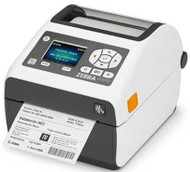Thermal Printers
Posted by JB on 16th Feb 2021
Thermal Printers
Thermal printers are among the most common printer types. Using a heated printhead, thermal printers use heat to activate or transfer pigments and produce a printed image on a substrate.
Thermal printing technology is less complex than inkjet or laser, with fewer moving parts to maintain. Thermal printers tend to be inexpensive to own and operate, and they are versatile. In addition, many thermal printers can produce extremely durable, waterproof, and chemical-proof labels depending on substrate and ribbon type used.
Thermal printers are used around the world by businesses to print a wide range of items including:
- Barcode labels
- Asset labels
- Jewelry and ring labels
- Lab specimen labels
- Receipts
- Coupons
- Pharmacy labels and drug instructions and interaction sheets
- Retail tags
- Shipping labels
- Invoices
- Contracts
- GHS chemical labels
- Weatherproof horticulture labels
- Meal tickets and food service labels
- Appointment reminders
- Patch panel labels
- Inventory labels
- Carton box labels
- Identification labels
- And more…
Types of Thermal Printers
With so many potential applications, it’s no wonder there are many different types of thermal printers. Some are made for specific purposes such as a point-of-sale receipt printer versus an industrial barcode thermal printer versus a portable label maker.
The main types of thermal printers are:
Direct thermal printers — Direct thermal printers do not require a ribbon, but they do require the use of direct thermal media. The media is chemically treated so that it darkens when the heated printhead comes in contact with it. This is what causes the image to appear on the paper or label. Thus, there’s nothing additional to buy beyond the direct thermal media. There’s no ink, ribbon, or toner required as the ink is embedded within the chemically treated paper. Because the substrate is heat-activated, it is sensitive to the environment and the printed image will fade over time.
Direct thermal printers are commonly used for applications where long-term durability is not required such as shipping labels and receipts. Direct thermal printers typically produce black graphics and text. Any color needed would need to be pre-printed on the substrate. You can use color flood coated media with direct thermal printers for color coding purposes.
Thermal transfer printers — Thermal transfer printers work with a variety of substrates including paper, vinyl, polyester, and other materials. These thermal printers require the use of a thermal transfer ribbon. The ribbon is coated with ink that is transferred to the substrate when heated by the thermal printhead.
Thermal transfer ribbons come in several formulations (wax, wax-resin, and resin) offering different characteristics. For general purpose use, a wax ribbon is an economical choice. If you want deeper blacks and greater durability, go with wax-resin. For the most durable prints, choose a resin thermal transfer ribbon. Thermal transfer ribbons are also available in various colors, so if you want to print labels with red text, you could use a thermal transfer printer with a red thermal transfer ribbon.
Thermal transfer printers are used for many of the same applications as direct thermal printers. However, because they can produce more durable labels, they are often used for more demanding applications such as weatherproof labels, GHS chemical labels, and asset labels.
In addition to the different thermal printing technologies (direct thermal and thermal transfer), thermal printers are built for different environments.
Industrial thermal printers — These thermal printers tend to be larger than the others and built for heavy-duty use. Label widths are typically wider, with 8 inches being common. Industrial thermal printers are commonly used in manufacturing, warehousing, and logistics environments and include advanced features such as industrial label cutters, network connectivity, centralized printer management, compatibility with enterprise applications, and more.
Desktop thermal printers — Desktop thermal printers typically connect to a computer via USB or Wi-Fi. They are more compact than industrial thermal printers and intended for lighter duty such as printing address and shipping labels.
Mobile thermal printers — Mobile thermal printers are intended for mobile use, often with a mobile phone. These thermal printers are small by design and meant for mobile applications such as deliveries, restaurant and bars, and pest control and other mobile services. Because of their smaller size, they use smaller label rolls and cores.
Label makers — You’re likely familiar with office label makers, which use tape cartridges to produce narrow labels for file folders, books, reports, and other materials. Label makers use thermal technology and tapes, making them very affordable and easy to use. Portable thermal label makers are commonly used by field technicians to label patch panels, electrical equipment, cables, and other items on job sites. Some models include rechargeable battery packs, magnetic mounts, and carrying cases.
Thermal Printer Accessories
While thermal printers use only media and, in the case of thermal transfer printers, thermal ribbons, you may want to accessorize your thermal printer. Below are some of the more popular options:
Label holders — A label holder, which is placed behind the printer, allows you to use larger label rolls than your thermal printer was designed for. Adding a label holder and using larger label rolls means fewer interventions for roll changes. In addition, you’ll often pay less per label when you buy a larger label roll.
Label rewinder — While many thermal printers have built-in cutters, in some instances, you’ll want to print roll to roll. By placing a label rewinder in front of the printer and disabling cutting, the label rewinder will wind the printed labels onto a core, which can then be placed in a label finisher for further finishing or a label applicator for immediate application to your items.
Optimedia Labs has a large selection of thermal printers for sale as well as direct thermal labels, thermal transfer labels, thermal ribbons, and accessories.


